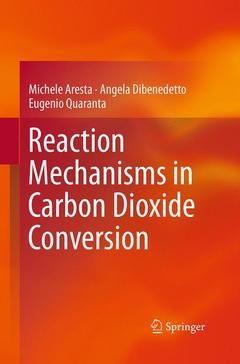Description
Reaction Mechanisms in Carbon Dioxide Conversion, Softcover reprint of the original 1st ed. 2016
Authors: Aresta Michele, Dibenedetto Angela, Quaranta Eugenio
Language: English
Subjects for Reaction Mechanisms in Carbon Dioxide Conversion:
108.44 €
In Print (Delivery period: 15 days).
Add to cart
Reaction Mechanisms in Carbon Dioxide Conversion
Publication date: 08-2016
Support: Print on demand
Publication date: 08-2016
Support: Print on demand
126.59 €
In Print (Delivery period: 15 days).
Add to cart
Reaction Mechanisms in Carbon Dioxide Conversion
Publication date: 11-2015
409 p. · 15.5x23.5 cm · Hardback
Publication date: 11-2015
409 p. · 15.5x23.5 cm · Hardback
Description
/li>Contents
/li>Comment
/li>
This book provides an analysis of the reaction mechanisms relevant to a number of processes in which CO2 is converted into valuable products. Several different processes are considered that convert CO2 either in specialty chemicals or in bulk products or fuels. For each reaction, the mechanism is discussed and the assessed steps besides the dark sites of the reaction pathway are highlighted. From the insertion of CO2 into E-X bonds to the reduction of CO2 to CO or other C1 molecules or else to C2 or Cn molecules, the reactions are analysed in order to highlight the known and obscure reaction steps. Besides well known reaction mechanisms and energy profiles, several lesser known situations are discussed. Advancing knowledge of the latter would help to develop efficient routes for the conversion of CO2 into valuable products useful either in the chemical or in the energy industry. The content of this book is quite different from other books reporting the use of CO2. On account of its clear presentation, ?Reaction Mechanisms in Carbon Dioxide Conversion? targets in particular researchers, teachers and PhD students.
The Carbon Dioxide Molecule.- CO2 Co-Ordination to Metal Centres: Modes of Bonding and Reactivity.- Interaction of CO2 with Electron Rich Moieties.- Insertion of CO2 into E-X Bond.- Interaction of CO2 with C-C Multiple Bonds.- Reaction Mechanisms in the direct Carboxylation of Alcohols, Polyols, Cyclic Ethers and Cyclic Amines to afford Monomeric Compounds and Polymeric Materials.- Carbon Dioxide Conversion in High Temperature Reactions.- One- and Multi-Electron Pathways for the Reduction of CO2 into C1 and C1+ Energy-Richter Molecules: Some Thermodynamic and Kinetic Facts.- Enzymatic Conversion of CO2 (Carboxylation Reactions and Reduction to Energy Rich C1 Molecules).- Thermodynamics and Applications of CO2-Hydrates.
Outlines lesser known mechanisms which stimulate the development of valuable products for the chemical and energy industry Suitable for researchers, teachers and PhD students Analyses reaction mechanisms for the conversion of CO2 to valuable products
© 2024 LAVOISIER S.A.S.




